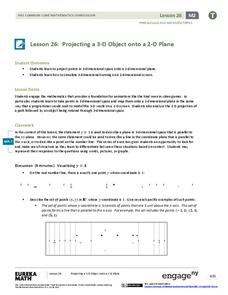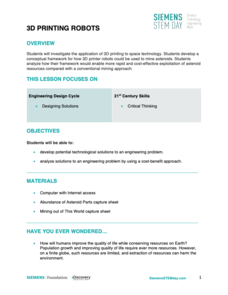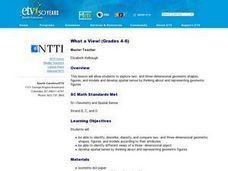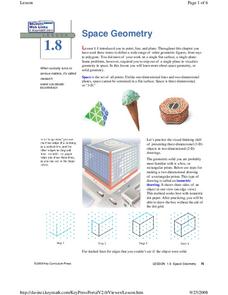EngageNY
Projecting a 3-D Object onto a 2-D Plane
Teach how graphic designers can use mathematics to represent three-dimensional movement on a two-dimensional television surface. Pupils use matrices, vectors, and transformations to model rotational movement. Their exploration involves...
North Carolina State University
Shapes
Expose youngsters to 3-D objects in a hands-on learning activity involving marshmallows and toothpicks. Engage your young mathematicians by introducing them to 3-D shapes by means of a story book. Explore 3-D shapes by manipulating...
Mathematics Vision Project
Module 5: Modeling with Geometry
Solids come in many shapes and sizes. Using geometry, scholars create two-dimensional cross-sections of various three-dimensional objects. They develop the lesson further by finding the volume of solids. The module then shifts...
Curated OER
Tomato Exploration
Create tomatoes in 15-20 minutes using this fun and interactive lesson plan! Learners listen to a book about tomatoes (recommendations listed), and focus on the vocabulary word tomato. They count the syllables...
Curated OER
Applied Science - Science and Math Lab
Create three dimensional objects in an applied science lesson plan. The goal is for your class to recognize, compare, and model shapes. Using cookie cutters and clay or play dough, they create models for three-dimensional shapes.
Curated OER
Living in a Geometrical World
Students participate in a series of hand-on, online, and multimedia activities to examine 2 dimensional and 3 dimensional shapes. They describe common geometric solids. They construct rectangular prisms using straws and ribbon.
EngageNY
Truncated Cones
Learners examine objects and find their volumes using geometric formulas in the 21st installment of this 25-part module. Objects take the shape of truncated cones and pyramids, and individuals apply concepts of similar triangles to find...
Curated OER
Make a Box
Young scholars use specific dimensions to create a box. In this geometry lesson plan, students analyze the different properties of two and three dimensional shapes. They make conjectures and use it to solve problems.
Curated OER
Faces, Vertices, Edges
Students identify the parts of three dimensional objects. In this geometry instructional activity, students find the number of faces, edges and vertices. They differentiate between prisms and polyhedra.
EngageNY
Coordinates of Points in Space
Combine vectors and matrices to describe transformations in space. Class members create visual representations of the addition of ordered pairs to discover the resulting parallelogram. They also examine the graphical representation...
Statistics Education Web
It Creeps. It Crawls. Watch Out For The Blob!
How do you find the area of an irregular shape? Class members calculate the area of an irregular shape by finding the area of a random sampling of the shape. Individuals then utilize a confidence interval to improve accuracy and use a...
Curated OER
Experiencing 3D
Students explore photography by utilizing digital cameras. In this 3 dimensional instructional activity, students create eye glasses using red and blue acetate in order to view 3-D images. Students utilize computers and digital cameras...
Curated OER
A Cone and Its Net
Create and investigate nets for solid shapes with your class. They identify the different parts and faces of each polygon and solid then calculate the surface area and volume of cones. They use circle sectors of varying sizes to build...
Discovery Education
3D Printing Robots
What is water worth to you? The answer probably depends on many different variables. Learners explore the value of water in space and what it takes to transport the resource to locations in a galaxy far far away. They then consider...
Curated OER
What a View!
Students examine two- and three-dimensional shapes and figures. Individually, they practice identifying the shape from various viewpoints. By completing this activity, they develop a spatial sense about how figures and shapes are...
Curated OER
Perfumania
Students identify various geometric shapes. Apply the given formulas to determine the volume of these shapes. Design their own container to conform to specifications provided. Use their knowledge of volume formulas and shapes to compute...
Curated OER
Objects Race 500
Young scholars explore the concept of "shape affects speed" through a series of experiments. In this physics lesson, students participate in an experiment in which various objects are released on an inclined plane. Speed and distance are...
Curated OER
Where has Polly Gone?
Students explore polygons and their uses in careers. They also discover polygons shapes in manmade objects and nature. They use their acquired knowledge to construct a strong structure using polygon shapes.
Curated OER
Shape Hunt
Young scholars explore two-dimensional and solid shapes. In this shapes and patterns geometry lesson, students work with a partner to create identifiable objects using tangrams. Young scholars describe the attributes of their shape and...
Curated OER
Making Sounds
Students perform three experiments to gain understanding of how pitch changes. In this sound lesson, students create a variety of sounds with different pitches. Students will record their data as the observe the differences in the sounds...
Curated OER
Cross Sections
Young visual learners explore different cross sections of 3-dimensional objects. First, cross sections of cubes are explored by using an interactive flash activity. This is then extended by looking at cross sections of spheres,...
Curated OER
Compare 2-D Shapes
Second graders explore and analyze plane shapes. For this plane shapes lesson, 2nd graders evaluate shape attributes to classify shapes correctly. Students work in groups to create different shapes.
Curated OER
Space Geometry
Students explore points, lines and planes as it relates to geometry. In this geometry lesson, students analyze space and explain wy it is 3-D and not flat or 2-D. They solve problems involving volume and 3-D shapes.
101 Questions
The Incredible Shrinking Dollar
Make money disappear! Young scholars watch as a copier shrinks a dollar bill to 75 percent of its size. Learners are left to determine the size of the dollar bill after nine passes through the copier.
